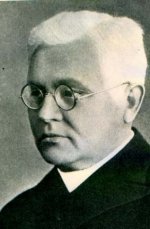The directory «Plots»
Tumas Juozas
(1869—1933)

Juozas Tumas, known as Vaizgantas, was a well-known activist of the Catholic wing of the Lithuanian revival; he advocated the ideas of Lithuanian unity on the basis of Catholicism. This Lithuanian prose author, historian, and critic of literature took part in the founding and publication of several newspapers of national and Catholic orientation of that epoch. Almost every new work of a Lithuanian author was the object of his attention as a critic and reviewer. Vaizgantas had very strict requirements of artistry and language. He was more lenient with younger authors, trying to discern their emerging talent; therefore he is sometimes called 'the diamond hunter.' Although Vaizgantas' native Eastern Aukshtaitish dialect differed most of all from all other Lithuanian dialects, he tried to set an example for other people and to speak and write in the standard Lithuanian language, which was beginning to take root. However, in his literary works he did not avoid borrowings if they seemed to him to be more expressive than the Lithuanian words. In addition he used many dialect words and loved to create neologisms.
Vaizgantas' most popular work is his psychological tale Uncles and Aunts (i.e., wives of uncles). In it the author describes the way of life of the Lithuanian village. He reveals the rich and poetic internal world of the simple village man. 'Uncles' is a term denoting not only relatives, but also a person of a certain social class of the end of the XIXth and beginning of the XXth century in Lithuania. Brothers and sisters, recognizing the seniority of the oldest son to run the farm, remained unmarried and worked without recompense on the brother's farm. Their position was intermediate between that of a family member and a hired hand. Such are the basic protagonists of the story, viz. Mykolas and Severija, because of their gracious demeanor and poetic soul called by the diminutives Mykoliukas and Severiute. In the story their drama of love is described with great artistic force. Love for Severiute is the only real ray of light in the life of Mykoliukas, but being passive by nature and lacking will and ambition, he loses his beloved girl and makes peace with his fate. Distinguished by a firmer character and more energetic strength, his neighbor Rapolas Geise is successful in attracting Severija to his side and he marries her. At Severija's wedding Mykoliukas for the last time plays the little violin he has made until its strings break. In this story scenes of nature, which accompany all the experiences of the protagonists, are extremely important.
Lithuania, 1933, Juozas Tumas
Lithuania, 1933, Juozas Tumas